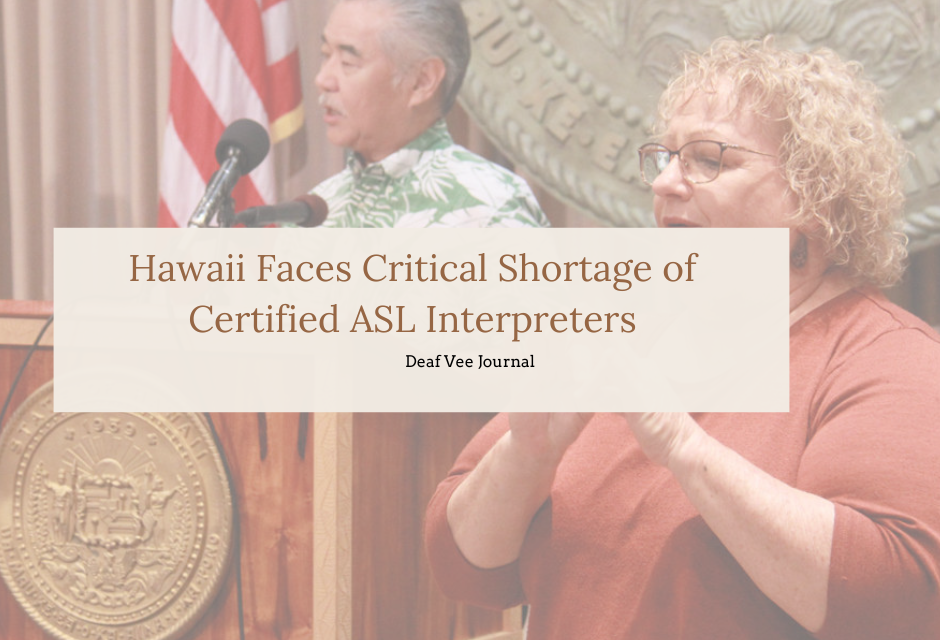Honolulu, HI – Hawaii is grappling with a severe shortage of certified American Sign Language (ASL) interpreters, a situation that has far-reaching implications for the state’s Deaf and hard-of-hearing community. In response, the Hawaii Legislature is considering Senate Bill 3290, which aims to address this pressing issue by establishing a working group to study and recommend solutions.
The Certification Hurdles
The current certification process for ASL interpreters in Hawaii is notably rigorous. To obtain a Hawaii State Sign Language Interpreter Credential, candidates must pass the Hawaii Quality Assurance System (HQAS) test, among other requirements. This process ensures that interpreters can communicate effectively and accurately in both receptive and expressive capacities, using specialized vocabulary as needed (Hawaii State Department of Health).
The state also offers provisional credentials to interpreters who hold valid certifications from other recognized entities or have demonstrated high performance in assessments. However, these provisional credentials are temporary and require interpreters to transition to full state certification within a specified period (Hawaii State Department of Health).
The Impact on the Deaf Community
The shortage of certified interpreters has significant consequences, particularly in critical areas such as healthcare, legal services, and education. In the judiciary system, for example, interpreters are essential for ensuring that Deaf and hard-of-hearing individuals have equal access to justice. The Hawaii State Judiciary has an ongoing Court Interpreter Certification Program aimed at expanding the pool of qualified interpreters, but the demand continues to outstrip supply (Hawaii Courts).
Legislative Action: Senate Bill 3290
Senate Bill 3290 seeks to tackle this issue head-on by mandating the formation of a working group under the Disability and Communication Access Board (DCAB). This group will conduct a comprehensive study on the current state of ASL interpreting services in Hawaii and identify barriers that prevent more interpreters from becoming certified. The group’s findings and recommendations will be reported to the legislature by December 31, 2024 (Hawaii State Department of Health).
The proposed legislation is a critical step towards improving communication access for Hawaii’s Deaf community. By addressing the barriers to certification and proposing solutions to increase the number of qualified interpreters, Senate Bill 3290 aims to ensure that all Deaf and hard-of-hearing individuals in Hawaii can receive the services they need without unnecessary delays or complications.
Nationwide Implications
This issue is not unique to Hawaii. Across the United States, there is a growing need for certified ASL interpreters, particularly as awareness of Deaf rights and accessibility increases. States are finding that the demand for qualified interpreters far exceeds the supply, leading to challenges in providing effective communication in educational, legal, and medical settings. National advocacy groups, such as the Registry of Interpreters for the Deaf (RID), have been calling for standardized certification processes and better support for interpreters to address this nationwide shortage (Hawaii State Department of Health).
Community and Advocacy
Organizations like the Office of Language Access (OLA) and the National Association of the Deaf (NAD) have been vocal about the need for more certified interpreters. They stress that the shortage not only affects access to essential services but also hampers the overall quality of life for Deaf individuals. Advocacy groups are hopeful that the passage of Senate Bill 3290 will lead to meaningful changes and enhance the inclusivity of services across the state (Hawaii State Department of Health)
Moving Forward
As Hawaii moves towards addressing this critical issue, the involvement of community stakeholders, government agencies, and advocacy groups will be crucial. The proposed working group will need to consider innovative solutions, such as enhanced training programs, incentives for certification, and better support for interpreters throughout their careers.
In the meantime, the Deaf community in Hawaii continues to navigate the challenges posed by the interpreter shortage, advocating for their right to effective communication and equal access to all services.
For further updates on this issue and other community news, stay tuned to our coverage and follow the latest developments in the Hawaii Legislature.





